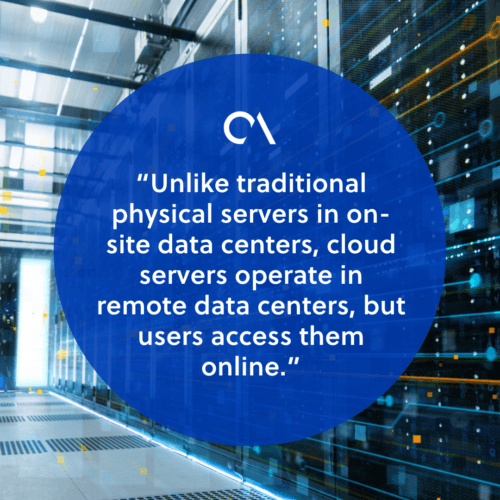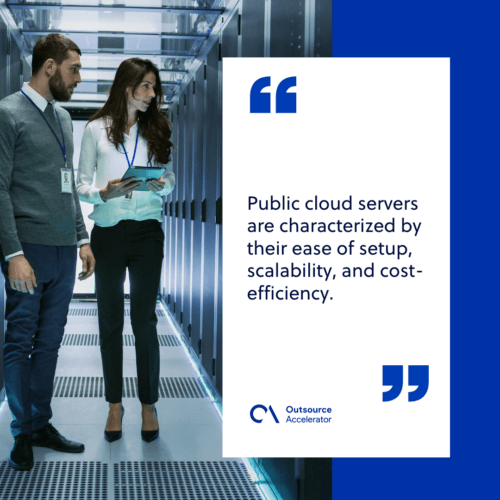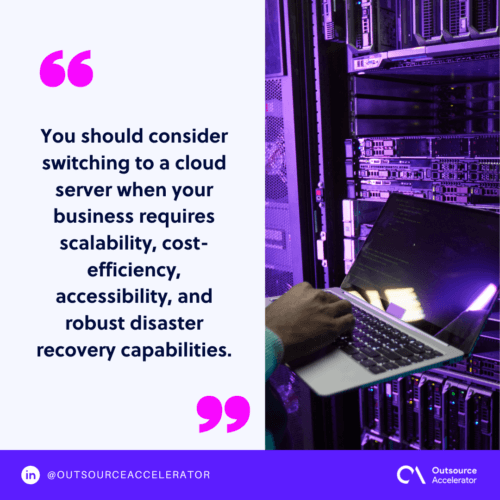Cloud server: Definition, types, and pros and cons

Businesses, individuals, and organizations now turn to cloud servers.
The emergence of this new tech solution can be attributed to the evolving needs and aspirations of modern computing and data management.
The emergence of cloud servers as a dominant computing paradigm can be attributed to technological advancements, such as:
- Enhanced data virtualization and organization
- Improved internet connectivity
These factors have made it more feasible for cloud service providers to offer scalable and accessible solutions.
For you to understand what a cloud server is all about, this article tackles its definition, how it works, its types, and the pros and cons of integrating it into your systems.
What is a cloud server?
A cloud server is a virtual server that operates in a cloud computing infrastructure. This environment is typically hosted and managed by a cloud service provider.
Unlike traditional physical servers in on-site data centers, cloud servers operate in remote data centers, but users access them online.

How does a cloud server work?
To understand how a cloud server works, let’s break down the process into key components:
- Virtualization – Cloud servers rely on virtualization technology, which allows multiple virtual servers to run on a single physical server. This efficient utilization of resources ensures cost-effectiveness and scalability.
- Remote access – Users can access their cloud servers from anywhere with an internet connection. Remote access makes cloud servers highly flexible and suitable for businesses with remote or distributed teams.
- Resource allocation – Cloud service providers allocate computing resources such as CPU, RAM, and storage to cloud servers based on the user’s requirements.
- Data storage – Cloud servers offer data storage capabilities, enabling users to store and retrieve their data securely. This data can be stored in various formats, including documents, databases, and media files.
- Pay-as-you-go model – Many cloud server providers offer a pay-as-you-go pricing model, where users only pay for the resources they consume. This cost structure is particularly advantageous for businesses looking to optimize their IT budgets.
5 types of cloud servers
Cloud servers come in various types, each catering to specific needs and preferences. Each cloud server type serves a unique set of needs and objectives, offering a range of benefits and considerations.
Here are the most common kinds:
1. Public cloud server
A public cloud server is a cloud computing solution offered and managed by third-party service providers, making it accessible to the general public.
Public cloud servers are characterized by their ease of setup, scalability, and cost-efficiency. They are well-suited for startups, small businesses, and individuals due to their low initial investment and pay-as-you-go billing model.
However, the shared resource nature of a public cloud server may lead to occasional performance fluctuations during peak usage times.

2. Private cloud server
Private cloud servers, in contrast, are dedicated to a single organization and can be hosted either on-premises or by a cloud provider.
This type offers a high degree of control and customization, allowing businesses to tailor their infrastructure to meet specific requirements. This is particularly appealing to organizations with stringent security and compliance needs.
Moreover, private cloud servers provide predictable and consistent performance levels, as they do not share resources with other users.
3. Hybrid cloud server
Hybrid cloud servers combine elements of both public and private clouds, offering a flexible and versatile solution.
Organizations that opt for hybrid cloud configurations leverage this for both non-sensitive and sensitive tasks.
This cloud server type is well-suited to businesses seeking the best of both worlds, as it provides the advantages of both public and private cloud models.
4. Community cloud server
A community cloud server is a shared infrastructure that caters to a specific group of organizations with common interests or requirements. In this setup, multiple organizations collaborate to use and manage the community cloud’s resources.
The key feature of a community cloud is that organizations within the community have a say in its management and security.
5. Multi-cloud server
A multi-cloud server approach involves services from multiple cloud providers, each offering distinct capabilities and advantages. Organizations adopt a multi-cloud strategy to avoid vendor lock-in, improve redundancy, and access specialized services.
Pros and cons of a cloud server
Let’s weigh the advantages and disadvantages of using cloud servers in general.
Pros of a cloud server
Cloud servers offer the following advantages:
- Disaster recovery – Cloud server providers often have data centers distributed across multiple regions. This ensures that data and applications remain accessible even in the face of hardware failures, natural disasters, or unexpected disruptions.
- Automatic updates – An effective cloud server undergoes routine tasks, including software updates, security patches, and system monitoring. This automation ensures that cloud servers are consistently up-to-date and secure.
- Secured usability – Cloud providers invest heavily in security infrastructure. This can often surpass what many organizations can achieve independently.
Cons of a cloud server
Despite its numerous benefits, firms must also be aware of the following drawbacks:
- Dependence on internet connectivity – Cloud server access is contingent upon internet connectivity. While this might not pose a problem in regions with reliable and high-speed internet, it can be a limitation in areas with intermittent connectivity or slow connections.
- Potential for vendor lock-in – Over time, cloud server users may depend on a specific provider’s services, tools, and APIs. This can restrict their ability to switch to alternative solutions or providers, limiting their flexibility.
- Costs can add up – Cloud server users may inadvertently increase expenses as they add more resources or fail to optimize their usage effectively.
When should you switch to a cloud server?
You should consider switching to a cloud server when your business requires scalability, cost-efficiency, accessibility, and robust disaster recovery capabilities.

Cloud servers are ideal for dynamic workloads, remote collaboration, and accessing data from anywhere with an internet connection.
However, the decision to switch depends on your needs, budget constraints, and the desire for agility in managing your IT resources.







 Independent
Independent




